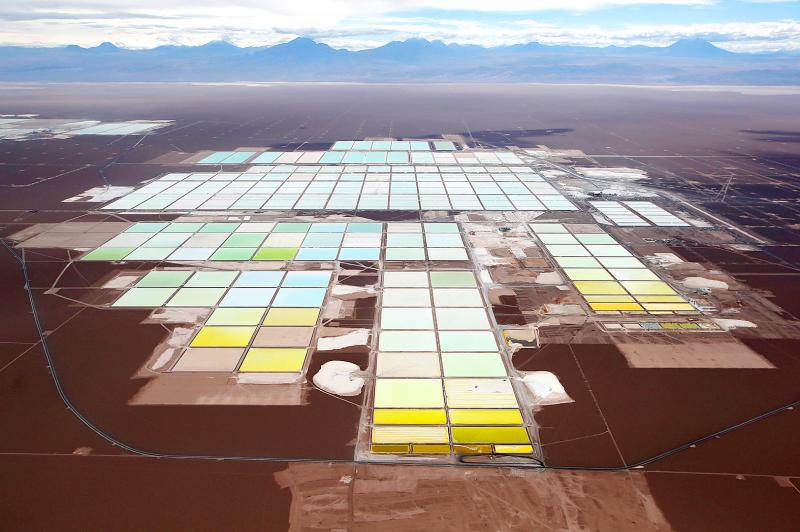Vulcan Energy Resources Ltd soared in Sydney after the mining company published a study suggesting it is one step closer to providing Europe’s auto industry with a key ingredient for electric vehicle (EV) batteries.
Vulcan on Friday jumped 29 percent, to the highest value since the shares started trading in 2018, after releasing a pre-feasibility study saying that its German lithium resources are the biggest in Europe.
The Australian start-up said that it can produce battery-grade lithium without emitting carbon dioxide, and do so more efficiently than its rivals.

Photo: Reuters
Its strategy involves extracting lithium using a geothermal power plant in southern Germany. The method is similar to what Warren Buffett’s Berkshire Hathaway Inc is researching in California’s Salton Sea.
The study values Vulcan’s lithium resources near Offenburg at 2.8 billion euros (US$3.4 billion) before taxes.
The project could extract enough for 1 million electric vehicle batteries per year and start production in 2024, the company said.
Vulcan hopes to benefit from rising demand for lithium in Europe, which is trying to build up a local battery manufacturing industry to reduce dependency on Asian suppliers.
Electric vehicles have become a focal point in the region, with governments bolstering subsidies to help automakers recover from the pandemic and comply with stricter emissions standards.
While fully electric vehicles drive emissions-free, the production of batteries has been criticized for its carbon footprint. Mining lithium from rocks is energy intensive, and extracting it from dried lake beds, as is often done in South America, drains local water reserves.
Vulcan said that its process is more environmentally friendly because its feedstock — hot salar brine — provides not only lithium, but also heat to generate renewable energy, reducing the method’s overall carbon footprint.
Friday’s gain values the firm at A$564 million (US$433.7 million).
Stringent environmental rules and local opposition have complicated the setup of new lithium mines in Europe as land owners and environmental groups fear pollution. Finland’s Keliber Oy in 2019 postponed its initial public offering amid protests against its activities.

TARIFF TRADE-OFF: Machinery exports to China dropped after Beijing ended its tariff reductions in June, while potential new tariffs fueled ‘front-loaded’ orders to the US The nation’s machinery exports to the US amounted to US$7.19 billion last year, surpassing the US$6.86 billion to China to become the largest export destination for the local machinery industry, the Taiwan Association of Machinery Industry (TAMI, 台灣機械公會) said in a report on Jan. 10. It came as some manufacturers brought forward or “front-loaded” US-bound shipments as required by customers ahead of potential tariffs imposed by the new US administration, the association said. During his campaign, US president-elect Donald Trump threatened tariffs of as high as 60 percent on Chinese goods and 10 percent to 20 percent on imports from other countries.

Taiwanese manufacturers have a chance to play a key role in the humanoid robot supply chain, Tongtai Machine and Tool Co (東台精機) chairman Yen Jui-hsiung (嚴瑞雄) said yesterday. That is because Taiwanese companies are capable of making key parts needed for humanoid robots to move, such as harmonic drives and planetary gearboxes, Yen said. This ability to produce these key elements could help Taiwanese manufacturers “become part of the US supply chain,” he added. Yen made the remarks a day after Nvidia Corp cofounder and chief executive officer Jensen Huang (黃仁勳) said his company and Taiwan Semiconductor Manufacturing Co (TSMC, 台積電) are jointly

United Microelectronics Corp (UMC, 聯電) expects its addressable market to grow by a low single-digit percentage this year, lower than the overall foundry industry’s 15 percent expansion and the global semiconductor industry’s 10 percent growth, the contract chipmaker said yesterday after reporting the worst profit in four-and-a-half years in the fourth quarter of last year. Growth would be fueled by demand for artificial intelligence (AI) servers, a moderate recovery in consumer electronics and an increase in semiconductor content, UMC said. “UMC’s goal is to outgrow our addressable market while maintaining our structural profitability,” UMC copresident Jason Wang (王石) told an online earnings

MARKET SHIFTS: Exports to the US soared more than 120 percent to almost one quarter, while ASEAN has steadily increased to 18.5 percent on rising tech sales The proportion of Taiwan’s exports directed to China, including Hong Kong, declined by more than 12 percentage points last year compared with its peak in 2020, the Ministry of Finance said on Thursday last week. The decrease reflects the ongoing restructuring of global supply chains, driven by escalating trade tensions between Beijing and Washington. Data compiled by the ministry showed China and Hong Kong accounted for 31.7 percent of Taiwan’s total outbound sales last year, a drop of 12.2 percentage points from a high of 43.9 percent in 2020. In addition to increasing trade conflicts between China and the US, the ministry said